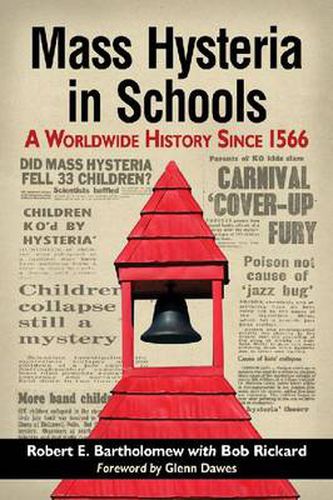Readings Newsletter
Become a Readings Member to make your shopping experience even easier.
Sign in or sign up for free!
You’re not far away from qualifying for FREE standard shipping within Australia
You’ve qualified for FREE standard shipping within Australia
The cart is loading…






This title is printed to order. This book may have been self-published. If so, we cannot guarantee the quality of the content. In the main most books will have gone through the editing process however some may not. We therefore suggest that you be aware of this before ordering this book. If in doubt check either the author or publisher’s details as we are unable to accept any returns unless they are faulty. Please contact us if you have any questions.
This book surveys the rich, colourful history of mass hysteria and kindred phenomena in schools, from outbreaks of demonic possession during witchcraft scares to twitching and shaking epidemics that became common in nineteenth century European schools, to more contemporary incidents of collapsing bands, itching frenzies, ghost panics and ‘mystery’ illnesses. Sociologist Robert Bartholomew and historian Robert Rickard trace mysterious outbreaks of strange behavior and illness in students through the centuries. From the possessed children who went into trance states and began to bark like dogs and cats in 16th and 17th century Holland, to an outbreak of Tourette’s-like symptoms among schoolgirls in Western New York during 2011-12, the book contains accounts written in everyday language. It provides a comprehensive treatment gleaned from scholarly journals and press reports. While many episodes are from the United States, separate chapters detail accounts from Europe, Asia, Africa, Latin America and Oceania. While some may take issue with the term
mass hysteria
and consider its use derogatory to females, it remains entrenched in the scientific lexicon. Furthermore, 99% of reports involve a preponderance of females, the causes of which are explored. For instance, this state of affairs may reflect the social conditioning of females and not necessarily any innate predisposition. This book constitutes the definitive and only book devoted to the subject.
$9.00 standard shipping within Australia
FREE standard shipping within Australia for orders over $100.00
Express & International shipping calculated at checkout
This title is printed to order. This book may have been self-published. If so, we cannot guarantee the quality of the content. In the main most books will have gone through the editing process however some may not. We therefore suggest that you be aware of this before ordering this book. If in doubt check either the author or publisher’s details as we are unable to accept any returns unless they are faulty. Please contact us if you have any questions.
This book surveys the rich, colourful history of mass hysteria and kindred phenomena in schools, from outbreaks of demonic possession during witchcraft scares to twitching and shaking epidemics that became common in nineteenth century European schools, to more contemporary incidents of collapsing bands, itching frenzies, ghost panics and ‘mystery’ illnesses. Sociologist Robert Bartholomew and historian Robert Rickard trace mysterious outbreaks of strange behavior and illness in students through the centuries. From the possessed children who went into trance states and began to bark like dogs and cats in 16th and 17th century Holland, to an outbreak of Tourette’s-like symptoms among schoolgirls in Western New York during 2011-12, the book contains accounts written in everyday language. It provides a comprehensive treatment gleaned from scholarly journals and press reports. While many episodes are from the United States, separate chapters detail accounts from Europe, Asia, Africa, Latin America and Oceania. While some may take issue with the term
mass hysteria
and consider its use derogatory to females, it remains entrenched in the scientific lexicon. Furthermore, 99% of reports involve a preponderance of females, the causes of which are explored. For instance, this state of affairs may reflect the social conditioning of females and not necessarily any innate predisposition. This book constitutes the definitive and only book devoted to the subject.